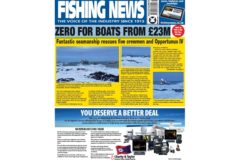Scots leader tells PM: ‘We need immediate help’
A Scottish west coast industry leader has warned that the industry in the region, and elsewhere in Scotland and the UK, is facing disaster unless it receives urgent financial support, reports Tim Oliver.
Simon Macdonald, chairman of the West Coast Regional Inshore Fisheries Group, has written to Boris Johnson to stress the urgency of the situation, and to call for immediate financial support, and for a six-month grace period to allow the industry to adjust to the post-Brexit exports red tape it has to contend with.

Simon Macdonald, chairman of the West Coast RIFG: “Most crippling crisis in the industry’s history.”
He told Fishing News: “Never in the history of our fishing industry has there been such a crippling crisis – to call the problems ‘teething troubles’ is almost an insult.”
He stressed the need for urgent financial support, and the early release of the £100m the UK government has announced to support the industry.
Speaking shortly after a meeting with Scottish fisheries minister Fergus Ewing to discuss the exports crisis, he said: “Fisheries is a devolved power to the Scottish government, and it beggars belief that Westminster should suddenly decide to administer the support funding to the industry, bypassing the Scottish government, especially with the success Marine Scotland made of giving support last year when the markets collapsed early on in the pandemic.
“Within four days of the discussions on how support should be given, the first Scottish boats were being paid out – in fact, the Scottish catching sector was the first industry in the UK to be paid support.”
Referring to the £23m compensation the government is to pay to exporters who have suffered losses, he said that the UK government is now ‘handling the entire process, which has been selected to only support the exporters’.
“The criteria for exporters to meet is extremely difficult, which will leave many not receiving any help at all. Payouts are only being made sometime in March, and there is a cap of £100,000 – some are losing that per day, and there will be casualties along the way. It’s not even a good sticking plaster.
“It seems that the catching fleet, which are mostly now tied up indefinitely, will not be receiving any support. Without the catching sector, there is no industry, which will be catastrophic to the many small communities around our shores that are built on, and totally reliant on, the boats being able to put to sea to earn a living.
“We know what the problems are – it’s solutions we need. We’re pushing hard for money – we need the £100m fund the UK government has announced to be released for our ailing fishermen.”
Simon Macdonald said that Fergus Ewing and his team are ‘working flat out, knocking on the doors of Michael Gove, the PM, George Eustice, Victoria Prentis to try to get funding out to the industry as soon as possible, but so far their efforts are falling on deaf ears’.
He also emphasised the reputational damage being done to the industry. “Customers can’t rely on us any more to get the products they need. We have to act urgently if we are to get our market back.”
He said fishermen have tried selling to the local domestic market, but this can only take a very limited amount. A ‘period of grace’ where the new requirements were temporarily suspended to allow exporters to get used to the new system was essential. “We have the technology to digitise the system so the documentation can be done online before the lorries arrive at the borders. That would speed things up enormously.”
Simon Macdonald added: “When I took on this role, I said I was ready to accept any challenge – little did I realise what was ahead!
“But we will get it sorted, although there will be casualties. I urge Fishing News readers: please bring your ideas and solutions to the table.
“A lot of midnight oil will be burned, but solutions must be found, and will be, through teamwork. I accept the challenge, and I will move heaven and earth to help our industry.”
‘Action needed urgently’, Johnson told
In his letter, Simon Macdonald tells the PM that ‘millions of pounds have been lost’ due to delays to live exports.
He says: “Businesses are being lost and jobs are being lost. Most of the fleet is tied up because processors and exporters cannot handle, or risk, further huge losses. Small communities around the country are struggling to cope as a result.”
He says that in recent talks with Fergus Ewing and industry leaders, he has put forward a number of ideas ‘for immediate action’.
- Urgent financial support for the industry must include fishermen, processors and exporters. Simon Macdonald thanks the PM for the support offered to exporters as ‘a temporary lifeline’, but with others is ‘dismayed’ that there will be no pay-out until March. “Prime minister, businesses really cannot last that long,” he says, adding: “Without the catching sector, there would be no fisheries industry at all.”
Referring to the £100m fund for the industry and £23m fund to compensate exporters, he tells the PM: “The industry as a whole urgently needs support if we are to have an industry with any future. I have met with fishermen this week and held meetings with my sub-groups, and they are all really desperate for help.
“A few have already given up, unable to support their families and pay the ongoing costs of their vessels. This is a true tragedy unfolding before us now.”
- The UK government must meet the EU and insist on a six-month ‘period of grace to sort out the top-heavy paperwork and bureaucracy’.
Simon Macdonald writes: “This… is a totally unacceptable situation. I understand that the UK government has offered a six-month period of grace to EU imports, so it is imperative that this should be reciprocated with us now.”
- During this period, paperwork and bureaucracy must be ‘streamlined’ into a much simpler ‘one-stop’ system.
Simon Macdonald tells Boris Johnson: “There is a viable 24-hour window to get live shellfish from boat to customer in Europe. Delays cannot be tolerated if our industry is to survive. Approximately 90% of our live Scottish shellfish goes to Europe. This is an industry that many communities rely on as their source of income. They are now being crippled with long-term consequences by this disaster.”
He also suggests that to streamline the exports process, documentation for all live and perishable goods – not only in fisheries – should be digitalised (with an auto-translate added) and centred from a single hub that can process the digitalised documentation while the lorries are in transit to the ports.
“Please consider these points carefully,” Simon Macdonald asks the prime minister, “before more jobs and communities throughout the UK are lost forever.”
The letter has been copied to Fergus Ewing, Michael Gove, Sir Keir Starmer, George Eustice and Victoria Prentis, all members of the West Coast RIFG and the chairs of the other Scottish RIFGs.






